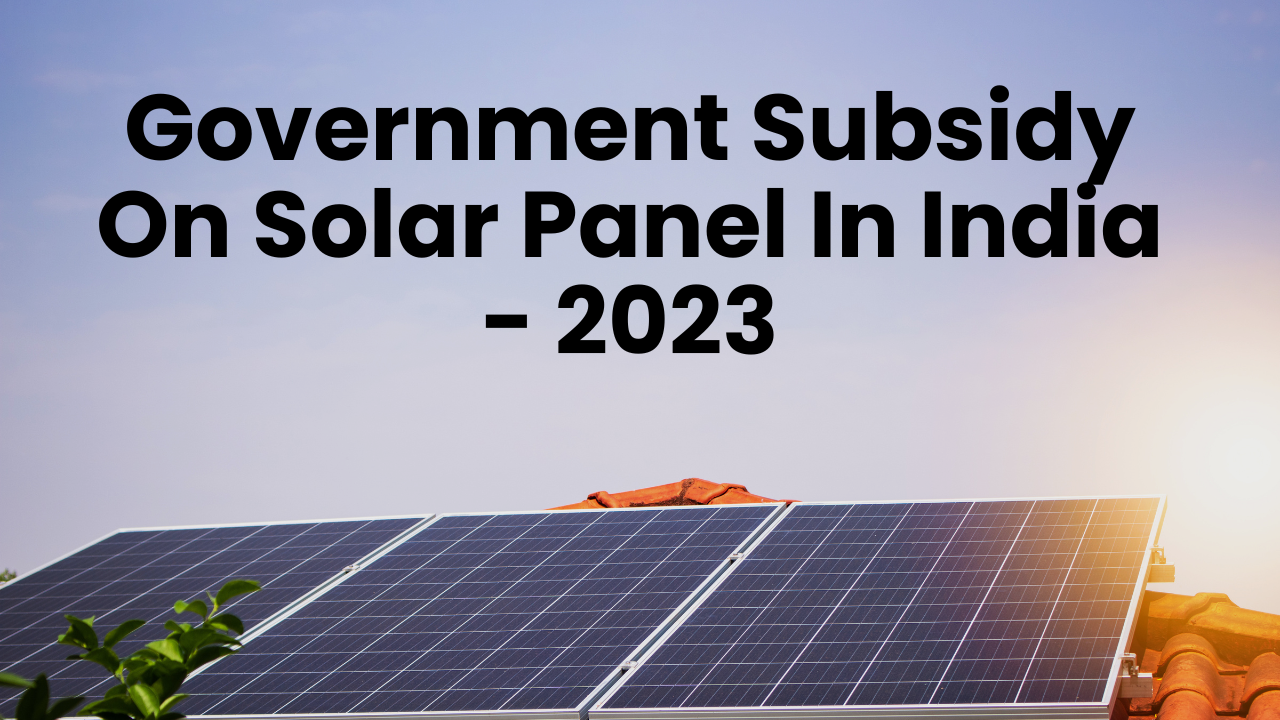Solar energy is a renewable and sustainable source of energy derived from the sun. It is considered one of the most reliable and abundant sources of clean energy. India, being a tropical country, has immense potential for solar energy as it receives abundant sunlight throughout the year.
The importance of solar energy in India lies in the fact that it can provide a solution to the country’s growing energy needs, while also reducing its carbon footprint. India is one of the largest energy consumers in the world, and as its population continues to grow, the demand for energy is also increasing. With the increasing concerns about climate change, the need for renewable energy sources like solar energy is more important than ever.
Moreover, solar energy has the potential to bring electricity to remote and rural areas where there is no access to the grid. This can have a transformative impact on the lives of people living in such areas. Additionally, solar energy can also create job opportunities in the manufacturing, installation, and maintenance of solar panels, contributing to the growth of the economy.
Overall, the importance of solar energy in India is significant, and with the government’s focus on promoting the use of solar energy, it has the potential to play a major role in India’s energy future.
As the world’s second-most populous country and one of the fastest-growing economies, India is a significant consumer of energy. With the increasing demand for energy and the negative impact of traditional energy sources on the environment, the Indian government has taken significant steps to promote renewable energy sources, such as solar energy. One such step is the provision of government subsidies for installing solar panels. In this post, we will discuss the importance of government subsidy for promoting solar energy in India.
Overview of Government Subsidy for Solar Panel in India
What is a solar subsidy?
A solar subsidy is a financial incentive provided by the government to promote the adoption of solar energy by reducing the initial investment cost. It is a form of subsidy or grant that aims to make solar energy more affordable for individuals, businesses, and organizations. Solar subsidies can come in different forms, including tax credits, cash grants, and rebates, and they may be offered by federal or state governments, local authorities, or utilities. The goal of solar subsidies is to encourage the use of clean, renewable energy sources and reduce dependence on fossil fuels, thereby promoting a sustainable energy future.
Why does the Government of India give Solar Subsidies?
The Government of India provides solar subsidies to promote the use of solar energy and to achieve the goal of energy security and sustainability. Solar energy is a clean, renewable, and abundant source of energy, and by promoting its use, the government aims to reduce the country’s dependence on non-renewable sources of energy such as coal and oil. Solar subsidies make solar energy more affordable and accessible to individuals and organizations, particularly those in rural areas, and also help to create jobs in the solar energy sector. Moreover, by promoting the use of solar energy, the government can reduce carbon emissions and combat climate change, leading to a healthier and more sustainable future for India.
Eligibility criteria and process for availing subsidies
Eligibility criteria and the process for availing of solar subsidies can vary depending on the state and the specific scheme. However, in general, the following are some common eligibility criteria and steps to avail of solar subsidies in India:
Eligibility Criteria:
- The applicant must be a resident of India and must be the owner of the property where the solar panels will be installed.
- The property must be a residential or commercial building, and it must have a clear title.
- The applicant must not have availed of any solar subsidy in the past.
- The solar panels must be installed by a recognized and registered vendor who is approved by the state nodal agency.
Process for availing subsidies:
- The first step is to identify the scheme that is applicable in your state and check the eligibility criteria.
- Contact a recognized vendor who will help you with the installation of solar panels and the subsidy application process.
- Submit the necessary documents, including identity proof, property papers, and electricity bills to the vendor.
- The vendor will submit the application on your behalf to the state nodal agency for verification and approval.
- Once the application is approved, the subsidy amount will be disbursed directly to the vendor, and the remaining amount will be paid by the applicant.
It is essential to note that the process and eligibility criteria may differ depending on the state and the specific scheme. Therefore, it is recommended to check the guidelines provided by the state nodal agency and consult with a recognized vendor for more information.
Benefits of Availing of Government Subsidy for Solar Panel Installation
Customer Benefits
Solar panel subsidies provide various benefits to different stakeholders, including customers, channel partners, and DISCOMs (Distribution Companies).
- Lower upfront costs: With government subsidies, customers can avail themselves of solar panels at a reduced cost, making it more affordable for homeowners and businesses to switch to solar energy.
- Energy savings: By installing solar panels, customers can generate their electricity and save on their energy bills over time.
- Reduced carbon footprint: Solar energy is a clean and renewable energy source, and by switching to solar, customers can reduce their carbon footprint and contribute to a cleaner environment.
- Increased property value: Solar panels can increase the resale value of the property, making it an attractive investment for potential buyers.
Overall, solar panel subsidies can help India achieve its renewable energy goals while providing economic, environmental, and social benefits to various stakeholders.
Subsidy Demerits
While there are many benefits of solar subsidies, there are also some demerits that should be considered. These include:
- High initial cost: Despite the subsidy, the initial cost of installing a solar panel system is still high, which can be a barrier for many people.
- Limited availability: Subsidies are often limited and may not be available to everyone, which can limit access to solar energy.
- Dependence on government policies: The availability and amount of subsidies can depend on government policies, which can change over time and lead to uncertainty for those planning to invest in solar energy.
- Potential for corruption: Subsidies can also create opportunities for corruption if not properly managed, leading to misuse of funds and inefficiencies in the implementation of subsidy programs.
- Unequal distribution: There is a risk that the subsidy may not reach the intended beneficiaries, resulting in an unequal distribution of benefits.
It is important to weigh both the benefits and the demerits of solar subsidies before deciding whether to take advantage of them.
Challenges Faced in Availing Government Subsidy for Solar Panel Installation
Some of the challenges faced in availing government subsidy for solar panel installation in India include:
- Lack of awareness about schemes and eligibility criteria: Many people are unaware of the various government schemes providing subsidies for solar panel installation and the eligibility criteria for availing them. This makes it difficult for people to take advantage of these schemes.
- Cumbersome application process and documentation requirements: The application process for availing subsidies can be complex and time-consuming, requiring a lot of documentation and paperwork. This can discourage people from applying for the subsidy.
- Delay in approval and disbursement of subsidy: The approval and disbursement of subsidy can take a long time, causing delays in the installation of solar panels. This can be a major deterrent for people who need the subsidy to install solar panels in their homes or businesses.
- Limited availability of subsidy: The government subsidies for solar panel installation may not be available in all areas or for all types of customers. This can make it difficult for some people to access the subsidy, even if they are eligible for it.
- Lack of technical expertise: Installing solar panels requires technical expertise, and many people may not have the knowledge or skills to install them on their own. This can increase the cost of installation and make it difficult for people to take advantage of the subsidy.
Solar Panel Subsidy Cost Estimation
With the commitment to Meeting more than 50% of energy requirements from renewables, Reducing cumulative emissions by one billion tonnes by 2030. Honorable Prime Minister of India, Shri Narendra Modiji launched the National Portal for Rooftop Solar on July 2022 to make sure there should be a uniform policy for Solar plant subsidy In the entire India i.e 40% upto 3 KW solar power plants and 20% on 4 KW and above plants upto 10 KW capacity plant.
This subsidy can significantly reduce the upfront cost of installing a solar power plant and make it more affordable for homeowners. Additionally, the central government of India offers this subsidy by DBT i.e direct benefit transfer to the consumer’s bank account which ensures transparency.
A Brief idea of Subsidy on the solar plant in India is explained below table representation.
| 3KWp Solar power Plant | ₹43764 |
| 4KWp Solar power Plant | ₹51202 |
| 5KWp Solar power Plant | ₹58534 |
| 6KWp Solar power Plant | ₹65865 |
| 7KWp Solar power Plant | ₹73195 |
| 8KWp Solar power Plant | ₹80526 |
| 9KWp Solar power Plant | ₹87856 |
| 10KWp Solar power Plant | ₹94822 |
Conclusion
In conclusion, the government subsidy on solar panel installation in India is an excellent initiative to promote the use of renewable energy sources and reduce the country’s dependence on non-renewable energy sources. Solar energy has enormous potential in India, given its abundant sunlight throughout the year. The subsidy provides financial support to individuals, businesses, and organizations to invest in solar energy and shift towards a greener and more sustainable future. However, despite the benefits, there are also some challenges in availing of the subsidy, including lack of awareness, the complex application process, and delays in approval and disbursement. Overall, the government subsidy on solar panel installation is a step in the right direction toward a cleaner and greener future, and more efforts are needed to promote the use of solar energy and make it more accessible to the masses.
Before thinking of going solar it is advised to understand requirements by your Average monthly electricity bill, Roof Area, and doing a shadow analysis of your roof, you can do it by yourself or you can hire a top Solar EPC (Engineering, Procurement & Construction) Company of your area. you can calculate your requirement by using the solar calculator feature and take a conscious decision.
ॐ सूर्याय नम:



